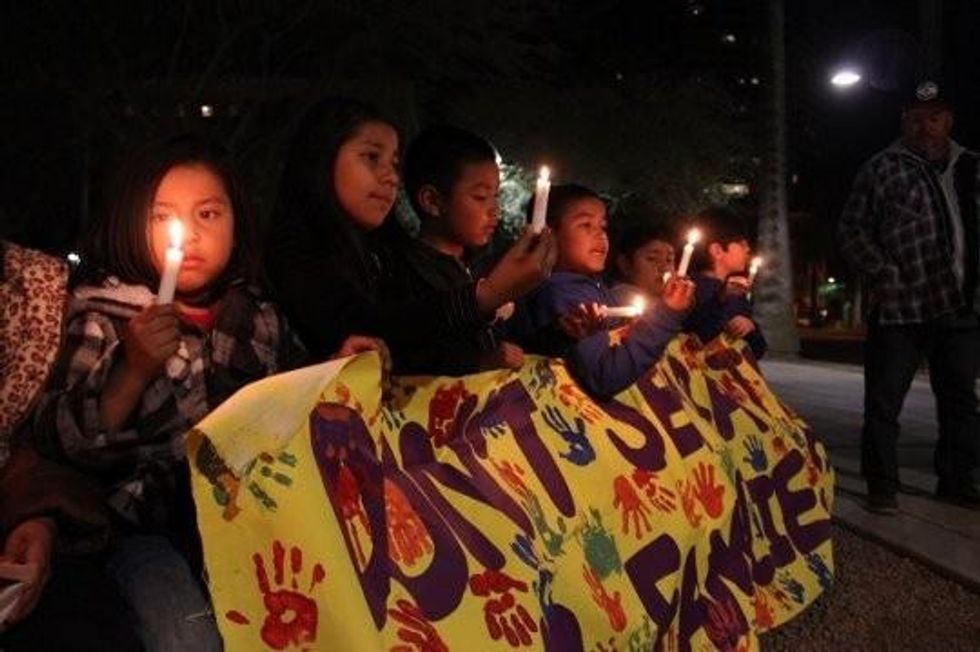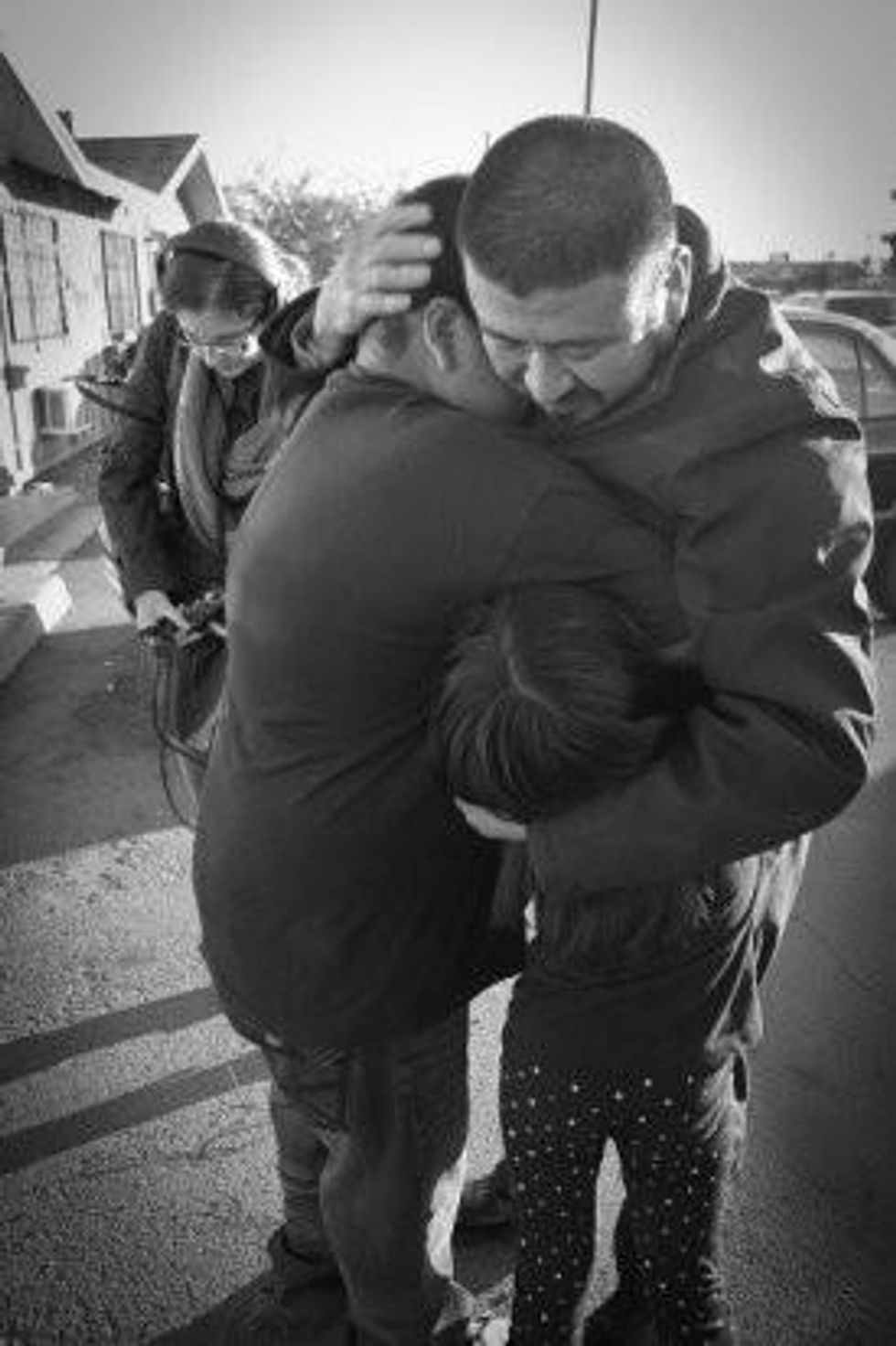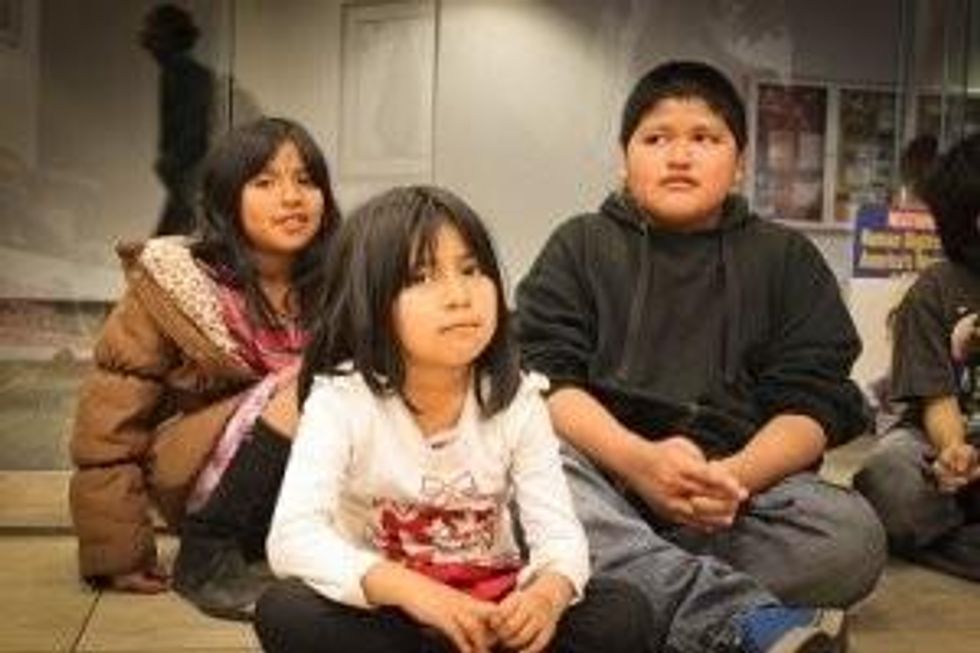

SUBSCRIBE TO OUR FREE NEWSLETTER
Daily news & progressive opinion—funded by the people, not the corporations—delivered straight to your inbox.
5
#000000
#FFFFFF
To donate by check, phone, or other method, see our More Ways to Give page.


Daily news & progressive opinion—funded by the people, not the corporations—delivered straight to your inbox.
There's nothing special about the Arma family. They're like countless other American households, with parents working hard to raise their kids right in a blue-collar sunbelt immigrant community in Phoenix.


It's a perverse testament to the upside-down world that our immigration system has created: it's actually a small miracle for Edi's family to stay intact, instead of falling into the monstrous statistic of households arbitrarily ripped apart by a government obsessed with "security."
In an interview with Democracy Now!, Edi recalled his time in detention as his case was stuck in limbo and community members frantically rushed to stop his deportation proceedings:
The communication isn't easy, so I wasn't able to constantly talk to my family. I didn't know what was going on. I wasn't able to let them know what was going on in there with me. I rarely communicated with them. It was hard. But the most frustrating thing was the fact that I wasn't able to be with my kids and thinking and having that thought of possibly never having--never being able to see my children again. I think that was the hardest thing. But thanks to all the movement and the organizations and the activists that were out there who helped me without knowing me, I'm here now.
Photographer Diane Ovalle has chronicled the campaign to keep the family together, away from the bluster of immigration politics and Senate floor speeches.

Most of the Beltway arguments over immigration reform will deal with the economic "benefits" versus the "costs" of regularizing immigration status for millions of undocumented workers. Some will address panic over porous borders by demanding further militarization of the already-garrisoned dividing line between the U.S. and Mexico. Others will express unabashedly racist fears about "assimilation," the "browning" of the American landscape, and the social implications of the nation's demographic destiny.
None of that matters to the Armas. They're asking for something that is far simpler than any of the reform proposals, and yet absurdly hard to attain: the security of staying together and knowing they won't be forced apart again.
Next time you hear a politician talk about "security," don't think about borders. Think about Edi.
-Michelle Chen
See more images here.
All images copyright 2013 Diane Ovalle
Dear Common Dreams reader, The U.S. is on a fast track to authoritarianism like nothing I've ever seen. Meanwhile, corporate news outlets are utterly capitulating to Trump, twisting their coverage to avoid drawing his ire while lining up to stuff cash in his pockets. That's why I believe that Common Dreams is doing the best and most consequential reporting that we've ever done. Our small but mighty team is a progressive reporting powerhouse, covering the news every day that the corporate media never will. Our mission has always been simple: To inform. To inspire. And to ignite change for the common good. Now here's the key piece that I want all our readers to understand: None of this would be possible without your financial support. That's not just some fundraising cliche. It's the absolute and literal truth. We don't accept corporate advertising and never will. We don't have a paywall because we don't think people should be blocked from critical news based on their ability to pay. Everything we do is funded by the donations of readers like you. Will you donate now to help power the nonprofit, independent reporting of Common Dreams? Thank you for being a vital member of our community. Together, we can keep independent journalism alive when it’s needed most. - Craig Brown, Co-founder |


It's a perverse testament to the upside-down world that our immigration system has created: it's actually a small miracle for Edi's family to stay intact, instead of falling into the monstrous statistic of households arbitrarily ripped apart by a government obsessed with "security."
In an interview with Democracy Now!, Edi recalled his time in detention as his case was stuck in limbo and community members frantically rushed to stop his deportation proceedings:
The communication isn't easy, so I wasn't able to constantly talk to my family. I didn't know what was going on. I wasn't able to let them know what was going on in there with me. I rarely communicated with them. It was hard. But the most frustrating thing was the fact that I wasn't able to be with my kids and thinking and having that thought of possibly never having--never being able to see my children again. I think that was the hardest thing. But thanks to all the movement and the organizations and the activists that were out there who helped me without knowing me, I'm here now.
Photographer Diane Ovalle has chronicled the campaign to keep the family together, away from the bluster of immigration politics and Senate floor speeches.

Most of the Beltway arguments over immigration reform will deal with the economic "benefits" versus the "costs" of regularizing immigration status for millions of undocumented workers. Some will address panic over porous borders by demanding further militarization of the already-garrisoned dividing line between the U.S. and Mexico. Others will express unabashedly racist fears about "assimilation," the "browning" of the American landscape, and the social implications of the nation's demographic destiny.
None of that matters to the Armas. They're asking for something that is far simpler than any of the reform proposals, and yet absurdly hard to attain: the security of staying together and knowing they won't be forced apart again.
Next time you hear a politician talk about "security," don't think about borders. Think about Edi.
-Michelle Chen
See more images here.
All images copyright 2013 Diane Ovalle


It's a perverse testament to the upside-down world that our immigration system has created: it's actually a small miracle for Edi's family to stay intact, instead of falling into the monstrous statistic of households arbitrarily ripped apart by a government obsessed with "security."
In an interview with Democracy Now!, Edi recalled his time in detention as his case was stuck in limbo and community members frantically rushed to stop his deportation proceedings:
The communication isn't easy, so I wasn't able to constantly talk to my family. I didn't know what was going on. I wasn't able to let them know what was going on in there with me. I rarely communicated with them. It was hard. But the most frustrating thing was the fact that I wasn't able to be with my kids and thinking and having that thought of possibly never having--never being able to see my children again. I think that was the hardest thing. But thanks to all the movement and the organizations and the activists that were out there who helped me without knowing me, I'm here now.
Photographer Diane Ovalle has chronicled the campaign to keep the family together, away from the bluster of immigration politics and Senate floor speeches.

Most of the Beltway arguments over immigration reform will deal with the economic "benefits" versus the "costs" of regularizing immigration status for millions of undocumented workers. Some will address panic over porous borders by demanding further militarization of the already-garrisoned dividing line between the U.S. and Mexico. Others will express unabashedly racist fears about "assimilation," the "browning" of the American landscape, and the social implications of the nation's demographic destiny.
None of that matters to the Armas. They're asking for something that is far simpler than any of the reform proposals, and yet absurdly hard to attain: the security of staying together and knowing they won't be forced apart again.
Next time you hear a politician talk about "security," don't think about borders. Think about Edi.
-Michelle Chen
See more images here.
All images copyright 2013 Diane Ovalle